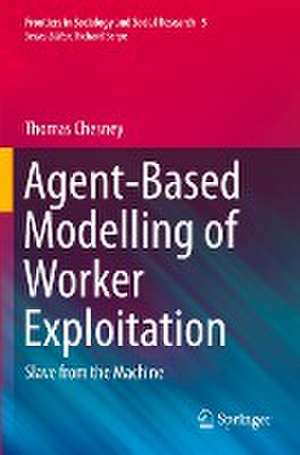Agent-Based Modelling of Worker Exploitation: Slave from the Machine: Frontiers in Sociology and Social Research, cartea 5
Autor Thomas Chesneyen Limba Engleză Paperback – 24 iul 2022
| Toate formatele și edițiile | Preț | Express |
|---|---|---|
| Paperback (1) | 721.81 lei 6-8 săpt. | |
| Springer International Publishing – 24 iul 2022 | 721.81 lei 6-8 săpt. | |
| Hardback (1) | 727.80 lei 6-8 săpt. | |
| Springer International Publishing – 23 iul 2021 | 727.80 lei 6-8 săpt. |
Preț: 721.81 lei
Preț vechi: 880.26 lei
-18% Nou
Puncte Express: 1083
Preț estimativ în valută:
138.13€ • 142.71$ • 114.90£
138.13€ • 142.71$ • 114.90£
Carte tipărită la comandă
Livrare economică 20 martie-03 aprilie
Preluare comenzi: 021 569.72.76
Specificații
ISBN-13: 9783030751364
ISBN-10: 3030751368
Ilustrații: XIX, 171 p. 41 illus., 30 illus. in color.
Dimensiuni: 155 x 235 mm
Greutate: 0.28 kg
Ediția:1st ed. 2021
Editura: Springer International Publishing
Colecția Springer
Seria Frontiers in Sociology and Social Research
Locul publicării:Cham, Switzerland
ISBN-10: 3030751368
Ilustrații: XIX, 171 p. 41 illus., 30 illus. in color.
Dimensiuni: 155 x 235 mm
Greutate: 0.28 kg
Ediția:1st ed. 2021
Editura: Springer International Publishing
Colecția Springer
Seria Frontiers in Sociology and Social Research
Locul publicării:Cham, Switzerland
Cuprins
Part I: Philosophy.- Chapter 1. Computing Slavery.- Chapter 2. A Philosophy of Agent Based Modelling.- Chapter 3. The Emergence of Slavery.- Chapter 4. A Culture of Acceptance.- Part II : Application.- Chapter 5. Human Trafficking.- Chapter 6. Identifying Abuses.- Chapter 7. How to Free a Slave.- Part III: Practice.- Chapter 8. Designing an Agent Model.- Chapter 9. Statistics-for and Statistics-with Agent Models.- Chapter 10. Final Thoughts.
Notă biografică
Thomas Chesney is a British-Irish computational social scientist at the University of Nottingham where he studies the behaviour of networked individuals, particularly in the context of modern slavery. He is the author of several books including Searching For Patterns, a popular science book about data mining, and is co-author of the textbook Principles of Business Information Systems. He teaches topics around data management and data manipulation, and hosts the YouTube channel Wondermass which creates videos about social science even though no one watches them.
Textul de pe ultima copertă
This book illustrates the potential for computer simulation in the study of modern slavery and worker abuse, and by extension in all social issues. It lays out a philosophy of how agent-based modelling can be used in the social sciences. In addressing modern slavery, Chesney considers precarious work that is vulnerable to abuse, like sweat-shop labour and prostitution, and shows how agent modelling can be used to study, understand and fight abuse in these areas. He explores the philosophy, application and practice of agent modelling through the popular and free software NetLogo.This topical book is grounded in the technology needed to address the messy, chaotic, real world problems that humanity faces—in this case the serious problem of abuse at work—but equally in the social sciences which are needed to avoid the unintended consequences inherent to human responses. It includes a short but extensive NetLogo guide which readers can use to quickly learn this software and go on todevelop complex models. This is an important book for students and researchers of computational social science and others interested in agent-based modelling.
Caracteristici
Explores the use of agent based modelling to understand modern slavery and worker abuse Features a discussion of the practicalities of turning social theories into agent models Presents an introductory guide to NetLogo programming for agent modelling







